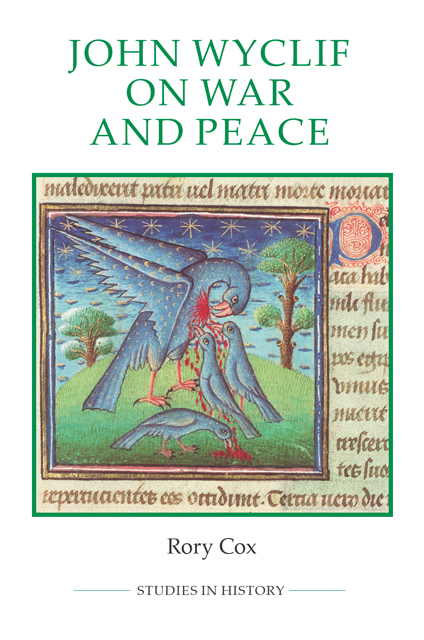Book contents
- Frontmatter
- Dedication
- Contents
- Acknowledgements
- Abbreviations
- A note on the chronology of Wyclif’s Latin works
- Introduction: War, peace and Wyclif
- 1 The development of just war doctrine up to the fourteenth century
- 2 Wyclif’s rejection of just cause
- 3 Wyclif’s rejection of proper authority
- 4 Wyclif’s rejection of correct intention
- 5 Wyclif on politics
- 6 The medieval pacifist
- Conclusion
- Bibliography
- Index
Introduction: War, peace and Wyclif
Published online by Cambridge University Press: 24 February 2023
- Frontmatter
- Dedication
- Contents
- Acknowledgements
- Abbreviations
- A note on the chronology of Wyclif’s Latin works
- Introduction: War, peace and Wyclif
- 1 The development of just war doctrine up to the fourteenth century
- 2 Wyclif’s rejection of just cause
- 3 Wyclif’s rejection of proper authority
- 4 Wyclif’s rejection of correct intention
- 5 Wyclif on politics
- 6 The medieval pacifist
- Conclusion
- Bibliography
- Index
Summary
War in late medieval Europe – its cause, its practice and its effects – has been the subject of countless scholarly works. In view of this, it would be fair to say that we know a good deal more about the enmities of late medieval men and political communities than we know about their friendships. But, amid this sea of military history, there remains at least one area which has remained largely submerged; that is, the late medieval intellectual analysis of war, especially in the fields of theology, law and political philosophy. General histories of just war doctrine use the work of Thomas Aquinas (1225–74) as a convenient stepping-stone to traverse the period from the publication of Gratian’s Decretum in the mid-twelfth century (or worse, from the writings of Augustine at the turn of the fifth century) to that of Francesco de Vitoria (c. 1483–1546), thereby ignoring fourteenth- and fifteenth-century analyses of war altogether. Even Frederick Russell’s seminal study, The just war in the Middle Ages, terminates at the end of the thirteenth century. However, during the late Middle Ages there was a great deal of interest in the moral, theological, legal and political problems engendered by war and violence. Consequently, a significant body of literature was produced that is of direct relevance to the history of war. The principal subject of this book, the fourteenth-century English theologian and philosopher John Wyclif (c. 1330–84), is one such example of a late-medieval thinker who grappled with the problem of war in human society. Throughout his extensive Latin works, produced during the 1370s and 1380s, the complex and radical nature of Wyclif’s thought on war is revealed. One can see that he rejected both the theory and practice of traditional just war doctrine and replaced it with a set of ideas rooted in principles of Christian non-violence and non-resistance; ideas that, taken together, could reasonably be described as a doctrine of pacifism.
From the 1360s John Wyclif emerged as one of Oxford’s most prominent intellectual figures – the flos Oxoniae (‘flower of Oxford’), as one chronicler referred to him. Wyclif has certainly not suffered from a lack of scholarly attention.
- Type
- Chapter
- Information
- John Wyclif on War and Peace , pp. 1 - 14Publisher: Boydell & BrewerPrint publication year: 2014



